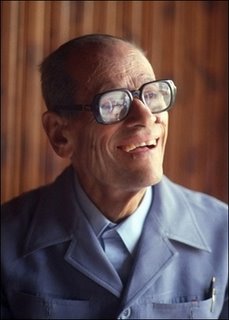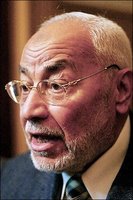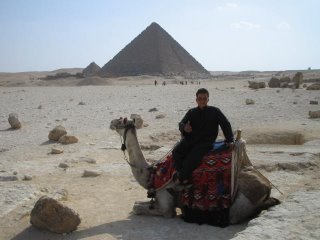Egypt's Nobel writer Nagib Mahfouz dies
 This is one of the moments when I wish I could to be home in Cairo. Since I was a child, the name of this fountain of creativity and authenticity named Naguib Mahfouz has been in the center of the corners of our lives. It was such a coincident that the first time I read for Mahfouz I was a teenager and it was his banned novel in Egypt "Awlad Haretna" or Children of the Alley that my family smuggled into our house. The novel was banned in Egypt by the Sunni Al Azhar religious institution in 1959 and until today on allegations that it symbolizes Allah or God and his children who are the prophets and messengers. It was one of those summers in my life that I spent with Mahfouz reading his ever-lasting unforgettable masterpiece, "Awlad Haretna". His death brings to me memories of reading his novel in every corner at my parents' home in Cairo. I also surprise myself to remember, how young I was yet I could fall in love with such big complicated novel. It is one of those novels you do not want to leave until you finish, but it is so big in size. When I moved to the U.S. , one of the things I was proud to carry all the way from Cairo to the United States for my friends were translated copies of this particular novel.
This is one of the moments when I wish I could to be home in Cairo. Since I was a child, the name of this fountain of creativity and authenticity named Naguib Mahfouz has been in the center of the corners of our lives. It was such a coincident that the first time I read for Mahfouz I was a teenager and it was his banned novel in Egypt "Awlad Haretna" or Children of the Alley that my family smuggled into our house. The novel was banned in Egypt by the Sunni Al Azhar religious institution in 1959 and until today on allegations that it symbolizes Allah or God and his children who are the prophets and messengers. It was one of those summers in my life that I spent with Mahfouz reading his ever-lasting unforgettable masterpiece, "Awlad Haretna". His death brings to me memories of reading his novel in every corner at my parents' home in Cairo. I also surprise myself to remember, how young I was yet I could fall in love with such big complicated novel. It is one of those novels you do not want to leave until you finish, but it is so big in size. When I moved to the U.S. , one of the things I was proud to carry all the way from Cairo to the United States for my friends were translated copies of this particular novel.Encouraged by the fatwa of Al-Azhar that his novel is banned on religious allegations and blasphemy that he dared to talk about God and his messengers, Islamic terrorists took advantage of believing they can send an infidel to his God to put him in hell. In 1994, terrorists wanted to spell his blood by stabbing him with a knife in his neck, like any of their cowardly acts they do anywhere to innocents. Fortunately, Mahfouz was saved in hospital. But the attack left him with serious consequences among them that he could not use his right arm properly as before to write. He got stabbed during one of his daily walks to his house coming from his favorite coffee shop where he used to write. For security reasons, he has to lose his freedom to walk freely as he used to.
Now, I believe in walking more than ever. Could be one of the reasons why Mahfouz lived until his 94 are his walkings from his house in Agouza to downtown on a daily basis his entire life until this coward attack. I believe walking could be a source of inspiration to love places you visit and people you meet. He was with no doubt a first-class Cairo lover. The details in his novels reflect the love to places and people.
"Awlad Haretna" or Children of the Ally was the main reason why Naguib Mahfouz won the Nobel Prize in 1988. Mahfouz is not only one of the most prominent renowned Egyptian intellectuals, but he is the first and only Arab writer to win the Nobel Prize for literature.
In spite of millions of readers in the Arab world, the Mahfouz's books remained unavailable in many Middle Eastern countries because of his support to President Sadat's Camp David peace treaty with Israel in 1978. This is one reason why I can also identify myself with Mahfouz is because of his support to peace, since I consider myself the peace generation. I am grateful to all those who supported peace because the alternative would have been bloody and bitter. I grew up without witnessing one single war feeling safe and secure because of people like Mahfouz who bravely stood next to our late President Sadat leaving him unabandoned for his hsitoric decision to make peace with Israel.
Born in Cairo in December 1911, Mahfuz is Egypt's most renowned intellectual with about 50 novels to his name. He began writing at the age of 17 and had his first novel published in 1939.
(Mahfouz) You will always be remembered in my thoughts and heart not because you are a Nobel winner but because you are part of my life. Today I am not only mourning you but my memories, the freedom to think and create, courage and the love to life embodied in all your writings and you ... Adieu Brave Egyptian!
Bush Extends Sympathies to the Egyptian People on Death of Naguib Mahfouz













